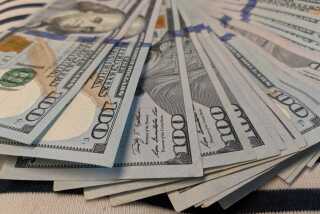Economists See Recession Tied to Trade Deficit
- Share via
WASHINGTON — Failure to reduce the large U.S. trade deficit risks a collapse in foreign confidence in the dollar that would send interest rates soaring and tip the economy into recession, a group of international economists said today.
The United States has little hope of reducing its huge trade deficit without an economic recession unless it cuts the federal deficit and allows the dollar’s value to decline further against other currencies, said William Cline, author of a new study released by the group.
“If foreigners lose confidence that the United States is making progress on its adjustment, there could be a run on the dollar,” Cline said at a news conference. “The United States could be forced to sharply raise interest rates to stop that run, (and) that in turn could cause serious recession.”
False Euphoria Cited
A sharp decline in the U.S. trade deficit in 1988 may have created a false euphoria about prospects for U.S. trade, Cline said. The trade imbalance has not shown much improvement since the middle of 1988, he said.
If no change is made in policies and exchange rates, the U.S. current account deficit, a broad measure of trade that includes both merchandise and financial exchanges, will rise to about $150 billion in 1992, the study said.
Last year the current account deficit fell to $135.33 billion from a record $153.96 billion in 1987.
Reducing federal deficit spending to levels set by the Gramm-Rudman-Hollings budget law is essential to dampening domestic demand for foreign goods and thus reducing the trade deficit to a sustainable $50 billion, he said.
Cline also said the dollar’s value needs to fall by an average 10% against a basket of currencies.
Without new policy measures, the U.S. deficit would not fall below $115 billion annually and would begin to rise again in the 1990s, concluded the report.
More to Read
Inside the business of entertainment
The Wide Shot brings you news, analysis and insights on everything from streaming wars to production — and what it all means for the future.
You may occasionally receive promotional content from the Los Angeles Times.










